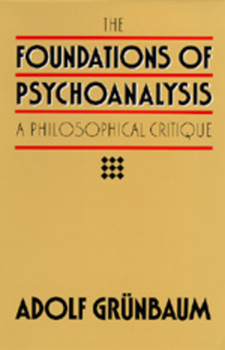The Foundations of Psychoanalysis: A Philosophical Critique Volume 2
Select Format
Select Condition 
Book Overview
This study is a philosophical critique of the foundations of Sigmund Freud's psychoanalysis. As such, it also takes cognizance of his claim that psychoanalysis has the credentials of a natural science. It shows that the reasoning on which Freud rested the major hypotheses of his edifice was fundamentally flawed, even if the probity of the clinical observations he adduced were not in question. Moreover, far from deserving to be taken at face value, clinical data from the psychoanalytic treatment setting are themselves epistemically quite suspect.
Format:Paperback
Language:English
ISBN:0520050177
ISBN13:9780520050174
Release Date:December 1985
Publisher:University of California Press
Length:256 Pages
Weight:0.95 lbs.
Dimensions:0.8" x 5.8" x 8.9"
Customer Reviews
2 ratings
The Lack of Foundations for Psychoanalysis
Published by Thriftbooks.com User , 16 years ago
Adolf Grünbaum's book was clearly not understood (or even read) by the other reviewer; it is *not* an "overview" or "companion" to Freud--it is an annihilation of Freudian thought, from the unconscious up, so to speak. This is one of the works I was reading when I decided to drop out of a doctorate program in English Literature, so--be warned!--I most likely have a few axes to grind. I had never heard of Grünbaum in the context of the many classes I had taken where I was forced to (uncritically) read Freud's various works . . . usually with a "post-structuralist" spin of some sort. There's a reason for this: Grünbaum exposes Freud as a conscious or unconscious pseudo-intellectual and charlatan. Moreover, he helps build several perspectives which call all of the "Tel Quel" sort of so-called "theory" into complete question. As devastating as Grünbaum is with regard to the master, however, he does give Freud the credit for having a (flawed) justification for his approach: the "tally argument" with two premises: (1) Only psychoanalytic interpretation and treatment can yield correct insight into the unconscious causes of a patient's neurosis. (2) Only the patient's correct insight into the unconscious causes of the patient's neurosis can cause a durable cure of this neurosis. As several have pointed out, following Grünbaum, this reduces to: (3) IF Cure, THEN Psychoanalysis. (4) NOT Psychoanalysis. ____________________________________ (5) NOT Cure. In other words, the "tally argument" merely begs the question. When all is said and done, as Grünbaum goes on to argue in later works, psychoanalysis is nothing more than a placebo. If critical insight and intellectual rigor are important to you, this is a good book to add to your library.
Comprende
Published by Thriftbooks.com User , 25 years ago
Anyone studying psychology whether it be as a concentration, a minor or as a major should read this book. The material isn't the most exciting but it's the point gets across. It helps in classes even when the book isn't offered. I definatley appreciate Freuds view and enjoy learning how to interpret the world through his vision.






